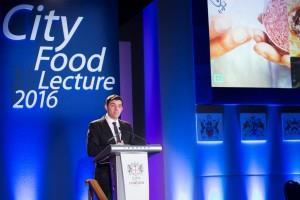Future trends in the food industry as well as the emergence of ‘invisible commerce’ were the focus at this year’s City Food Lecture.
The event was led by Christophe Jouan, chief executive of The Future Foundation.

The global trends analyst delivered a 40 minute address entitled ‘What, when and how will we be eating in 2025?’
Jouan predicted the rise of ‘invisible commerce’ in the food sector, as smart kitchen appliances will simply reorder basic food and household items when they run out, without the consumer even noticing.
He suggested this could revolutionise purchasing habits and create incredible “brand stickiness” for companies who use it successfully.
He saw this as the final step in the race to convenience for the food industry, preceded by new disruptive food buying mechanisms which deliver meal ingredients or even freshly cooked, locally sourced meals directly to consumers - bypassing the traditional retailer.
Jouan also touched on greater consciousness of health throughout society, driven by public awareness of rising obesity rates and the uptake of wearable health monitoring devices.
These devices will mark the end of ‘one-size –fits-all’ health initiatives and instead deliver personalised insights to consumers about what they need to do in that moment for their health and nutrition needs.
Jouan predicts that when equipped with far greater knowledge about the impacts of different food choices, people will balance indulgence in one area with restraint in another, perhaps justifying a burger by going to the gym.
Other projections included the rise of flexitarians - people who monitor their meat consumption due to health, price or environmental concerns.
For more information visit www.cityfoodlecture.com
This story was originally published on a previous version of the Meat Management website and so there may be some missing images and formatting issues.















